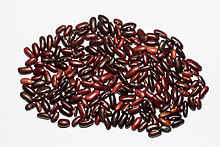– Classification:
– Red kidney bean (commonly known as rajma in India and surkh lobia in Pakistan)
– Light speckled kidney bean
– Red speckled kidney bean
– White kidney bean (also known as cannellini in Italy and lobia in India)
– Nutrition:
– Boiled kidney beans are 67% water, 23% carbohydrates, 9% protein, and low in fat
– In 100g, kidney beans provide 532kJ (127kcal) energy
– Rich source of protein, folate, iron, and phosphorus
– Moderate amounts of thiamine, copper, magnesium, and zinc
– Offer 20% or more of the Daily Value for protein and other nutrients
– Dishes:
– Rajma is a common dish in north India served with rice
– Red kidney beans are used in chili con carne and in Indian and Pakistani cuisine
– Red beans used in Louisiana for red beans and rice
– Small kidney beans in La Rioja, Spain, called caparrones
– In the Levant, kidney bean stew served with rice known as fasoulia
– Toxicity:
– Red kidney beans contain high levels of phytohemagglutinin
– Require pre-soaking and boiling for at least 10 minutes to destroy toxins
– Boiling for 30 minutes recommended by FDA to ensure safety
– Canned red kidney beans are safe to eat directly
– Eating raw or undercooked kidney beans can cause severe symptoms
– Cookbook:
– Wikibooks Cookbook has recipes for kidney beans like Bean Chili and Easy Chili
– Recipes for Minestra, Rice and Peas, and Vegetarian Bean Soup available
– Cookbook includes recipes for Three Bean Confetti Salad and Pandoras Feast
The kidney bean is a variety of the common bean (Phaseolus vulgaris) named for its resemblance to a human kidney.

| Nutritional value per 100 g (3.5 oz) | |
|---|---|
| Energy | 532 kJ (127 kcal) |
22.8 g | |
| Sugars | 0.3 g |
| Dietary fiber | 7.4 g |
0.50 g | |
8.7 g | |
| Vitamins | Quantity %DV† |
| Thiamine (B1) | 13% 0.16 mg |
| Riboflavin (B2) | 5% 0.06 mg |
| Niacin (B3) | 4% 0.58 mg |
| Pantothenic acid (B5) | 4% 0.22 mg |
| Vitamin B6 | 7% 0.12 mg |
| Folate (B9) | 33% 130 μg |
| Vitamin C | 1% 1.2 mg |
| Vitamin E | 0% 0.03 mg |
| Vitamin K | 7% 8.4 μg |
| Minerals | Quantity %DV† |
| Calcium | 2% 28 mg |
| Copper | 27% 0.24 mg |
| Iron | 16% 2.9 mg |
| Magnesium | 11% 45 mg |
| Phosphorus | 11% 142 mg |
| Potassium | 13% 403 mg |
| Sodium | 0% 2 mg |
| Zinc | 10% 1.07 mg |
| Other constituents | Quantity |
| Water | 67 g |
| †Percentages estimated using US recommendations for adults, except for potassium, which is estimated based on expert recommendation from the National Academies. | |
